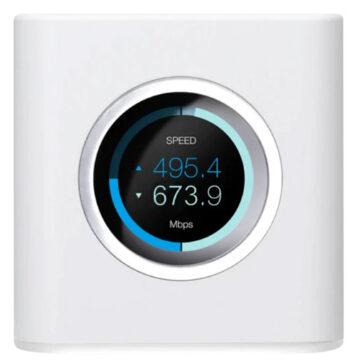Have you been experiencing buffering screens, dropped video calls, or Wi-Fi dead zones in your Charlotte home?
Our clients contact us about these problems in addition to lagging Internet speeds. It may be time to look at your home networking system to understand how fast your internet speeds really are. We often think our technologies are receiving enough power because we are paying for 500 Mbps, but that is a misconception.
What is Wi-Fi?
Before we get into the details of what you can do to improve your internet speed, let’s first explain a wireless or Wi-Fi network.
Wi-Fi is the wireless transmission of radio waves instead of wires to connect devices, such as smart TVs, computers, smartphones, and more, to high-speed Internet. Wi-Fi devices receive internet signals from an ISP or service provider, typically a modem, wireless mesh router, and access points. The proper mesh router is the first step in getting the fastest speeds.
At any given moment, many of us are using the Internet to work from home, tune in to our favorite shows and movies, or scroll through our favorite social media platforms. In many homes, family members are using wireless Internet simultaneously. Wi-Fi technology allows us to use our devices throughout the home.
Just because you pay for fiber or high-speed Internet doesn’t mean you’re getting those speeds throughout your home.
The Internet is not unlimited. If you pay for 300 Mbps (megabits per second), you can achieve that rate with the perfect setup, meaning every device is connected correctly and with the correct associated cables. Unfortunately, the ideal connection doesn’t exist for most homes and businesses, leaving consumers with spotty Internet.
- Older properties include poorly run category cables and substandard termination ends. These outdated or poor-quality interconnecting cables between wall plates and devices can all restrict the physical flow of data, taking your 300 Mbps and leaving you with whatever trickle of speed is available.
- Plaster, stucco, and brick walls can slow your Wi-fi down. Having to go through physical objects can weaken Wi-Fi signals.
- Dense Furniture can also slow down performance between routers, switches and wireless devices.
- Distance is a major factor in Wi-Fi performance. If a signal has to travel 30 feet through several walls, it can limit the signal strength.
What to do about slow Internet?
Paying the service provider more money for more speed is not a guaranteed way to fix slow internet speeds.
The average homeowner will need to navigate fixing this problem on their own. Solving your slow Internet is where a company like Audio Video Charlotte excels at providing rock-solid solutions, one of which applies to hardwiring as much as is physically possible. After hardwiring, a Wi-Fi extender or wireless mesh system would be a way to distribute the Internet throughout a property.
It’s up to you to maximize your Internet speeds yourself, so here at Audio Video Charlotte, we recommend the AmpliFi AFi-R High-Density Home Wi-Fi Router by Ubiquity or Eero to our clients because their connection to the Internet creates the ultimate Wi-Fi system which gives you, the user, the best wireless experience possible! Read more about AmpliFi HD HERE.
What is a mesh router or mesh wireless system, and how does it work?

A mesh router or mesh wireless system is a type of wireless network that uses multiple devices to create a single, seamless network. The devices in a mesh network are called nodes (wireless access points), and they are connected to each other wirelessly. This allows the network to cover a wider area and provide better performance than a traditional router.
A wireless access point, or WAP, pulls Wi-Fi from an existing transmission point to get a better signal.
In a mesh system, the individual mesh points can also be called wireless access points. A mesh system provides coverage throughout an entire location or building. If the network is busy, slow, or clogged, the Internet signal will instantly leap to any other mesh points to navigate the problem. The closest mesh point to your device does not guarantee that it is the one you are using. A mesh network recalibrates the signal without you having to select an additional point or navigate an obstruction.
Imagine a giant bag of sand and a single person (single router) has to support and move this heavy load single-handedly. For each mesh point, we add the additional mesh point to take away a portion of the load or burden on the entire system. If we have four people (or mesh points), each one only has to carry 25 pounds of load. The 100 pounds is distributed amongst four people (or mesh points around a home).
How Audio Video Charlotte can help!
- The most important thing is hardwiring your Internet to free up the amount of WIFI your devices use.
- Next, utilize mesh networking, and our favorite products, like the AmpliFi AFi-R High-Density Home Wi-Fi Router by Ubiquity or Eero, are used to give you the best signal inside your home or business from outside.

Do you have more questions? Our trained technicians are here to help! Call us, or email us to set up a consultation where we will take a deep dive into your system and connectivity and provide future solutions for better and faster wireless Internet.


